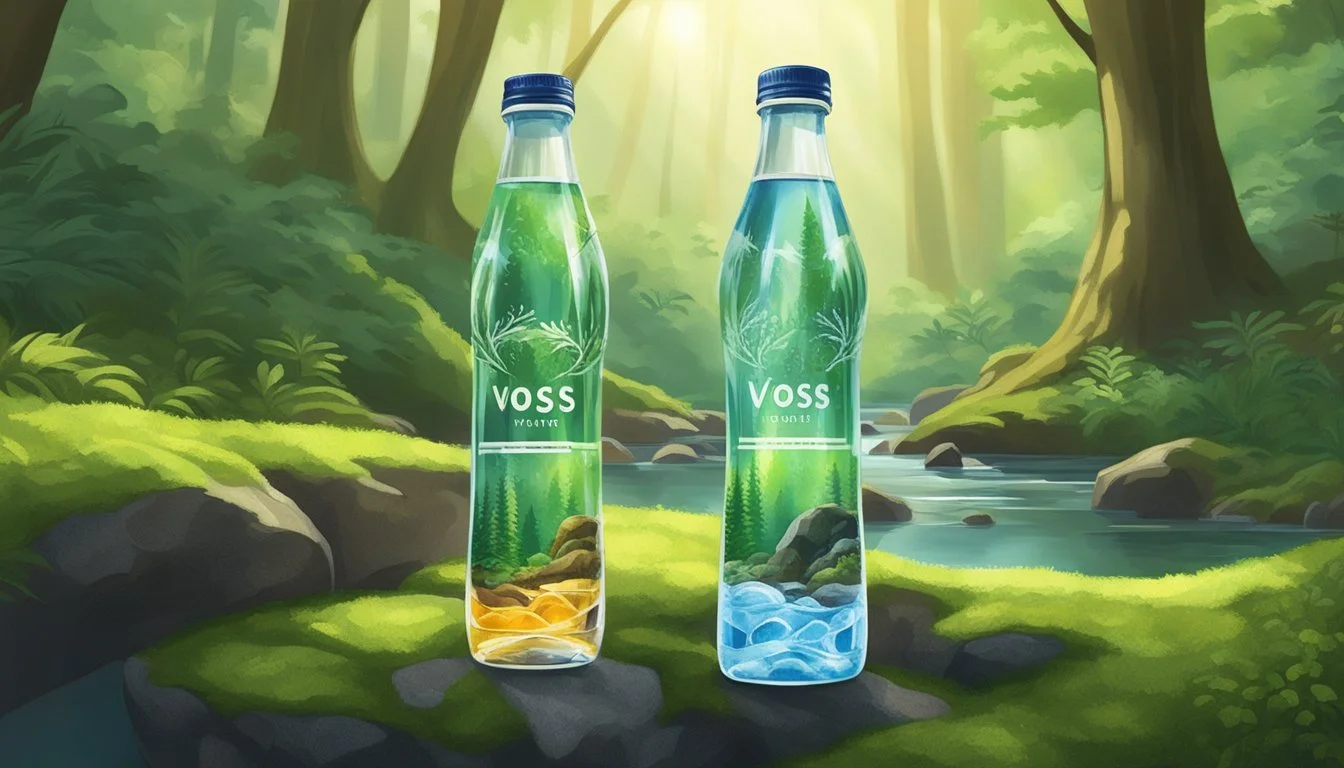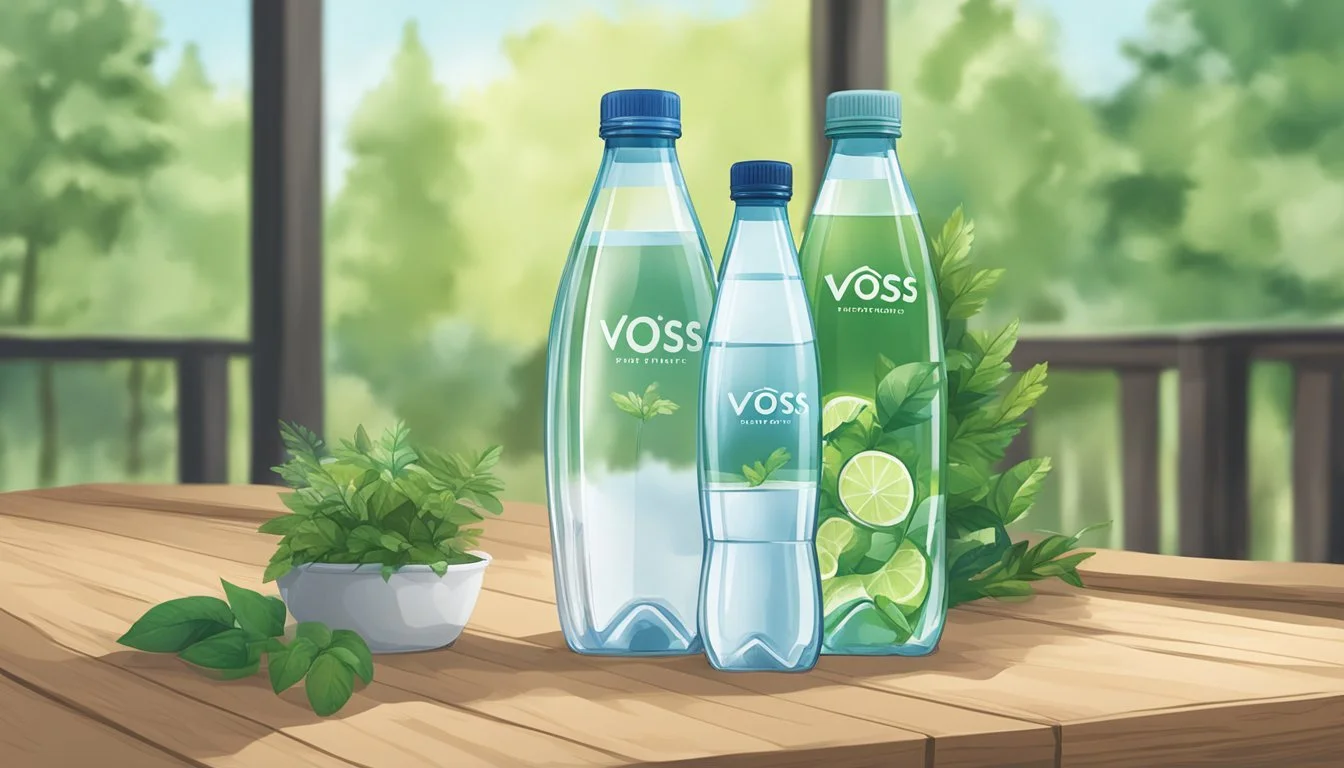Deer Park vs. Voss
Comparing Quality and Taste in Bottled Water Brands
When it comes to selecting bottled water, consumers are faced with a plethora of choices, each boasting unique sources, filtration processes, and taste profiles. Deer Park and Voss are two brands that stand out on the shelves, but for differing reasons. Deer Park, sourced from springs across the Eastern Seaboard of the United States, presents itself as a purveyor of 100% natural spring water. It is known for its crisp and clean taste which appeals to those who value the natural essence of water.
Voss, on the other hand, hails from Norway where it is extracted from an artesian source. With a slightly acidic pH level, Voss water claims a distinct taste that's influenced by the natural filtration of the Scandinavian terrain. The brand has carved out a niche for being both a premium beverage and a lifestyle choice with its iconic cylindrical bottle, positioning itself in the market as a symbol of sophistication and purity.
Evaluating Deer Park and Voss goes beyond just taste preferences or brand perception. It involves a scrutiny of their respective sources, their environmental impact, the presence of contaminants or additives, and the overall quality of water each brand offers to the health-conscious consumer. Both brands whilst having wide availability, also have specific challenges with distribution, with Voss being noted as more difficult to find in comparison to Deer Park.
Understanding Bottled Water
In evaluating bottled water options, it's essential to consider their origins, types, and the regulations ensuring their quality.
Origin of Bottled Water
The sources of bottled water include natural springs, artesian wells, or even carefully monitored and treated tap water systems. Natural spring water must be collected directly from a spring or through a borehole tapping the underground formation feeding the spring. For instance, Deer Park touts its collection of water from natural springs across the Eastern Seaboard.
Types of Bottled Water
There are several main categories of bottled water, each distinguished by its origin or treatment process:
Spring Water: Originates from a natural spring and retains the minerals from its source.
Mineral Water: Contains at least 250 ppm total dissolved solids (TDS); the minerals are inherently part of the water and not added later.
Purified Water: Processed to remove chlorine and other impurities. It includes water that has been distilled, deionized, or reverse-osmosis filtered.
Artisan or Artesian Water: Obtained from a well tapping a confined aquifer in which the water level stands at some height above the top of the aquifer.
Regulations and Standards
In the United States, the Environmental Protection Agency (EPA) sets standards for tap water, while the Food and Drug Administration (FDA) regulates bottled water. These agencies mandate specific guidelines for filtration and purification processes to ensure the safety of bottled water. EPA regulations include limits on levels of certain chemical contaminants and require frequent testing for microorganisms. The FDA counterparts mirror EPA standards for tap water but are specifically tailored for the processed and packaged bottled water industry.
Assessing Water Quality
When evaluating bottled waters like Deer Park and Voss, one must consider pH levels, mineral content, and purification processes. These factors directly impact the taste, health benefits, and overall perception of water quality.
PH Levels and Their Importance
The pH level of water indicates its acidity or alkalinity on a scale ranging from 0 to 14, with 7 being neutral. Deer Park water typically has a pH that is close to neutral, which is preferable for maintaining the body's natural balance. Voss, on the other hand, has a slightly higher pH level, which can help neutralize acid in the body, a claim favored by some health enthusiasts.
Mineral Content
Mineral content in water refers to the presence of essential electrolytes such as calcium, magnesium, and potassium. Deer Park water, sourced from springs, naturally contains a mix of minerals that contribute to its taste and nutritional value. Voss water boasts a low Total Dissolved Solids (TDS) level, which indicates lesser mineral content, but it maintains a reputation for its clean, crisp taste.
Purification Processes
The purification process is critical to ensuring the safety and quality of bottled water. Deer Park undergoes protective treatments including filtration and ozonation. Voss utilizes reverse osmosis and ultraviolet light treatment in its purification process, which effectively reduces impurities while retaining the water's natural freshness. Both brands adhere to strict standards to remove contaminants and to ensure their water is safe for consumption.
Comparing Brands
In this section, the qualities and sourcing of Deer Park and Voss water brands are explored, as well as how they stack up against other prominent bottled water names.
Deer Park
Deer Park touts 100% natural spring water, boasting origins from the Eastern Seaboard. Customers often praise it for its crisp and clean taste. Deer Park is a Nestlé brand, aligning with Pure Life, another product under Nestlé, which positions itself as an affordable yet average performer among the spectrum of bottled water.
Voss
Voss stands out with its Norwegian origins and a distinctive bottle design. It’s marketed as a premium brand with water sources protected from pollutants. Voss is often the choice for those valuing purity and taste, also maintaining a strong environmental commitment. It does not seem to have the same mass-market presence as Deer Park but offers a different value proposition through its premium positioning.
Other Popular Brands
When considering other bottled water brands, Aquafina and Dasani are more recognizable for their purified tap water origin. Evian, similar to Voss, provides natural spring water, but from the French Alps, with a reputation for mineral-rich content. Fiji water boasts a tropical rainfall source and positions itself with a silica-rich profile, contributing to a smooth mouthfeel. In contrast, Pure Life, being part of the Nestlé family with Deer Park, is characterized as affordable but less remarkable in taste tests. These brands, each with their distinctive qualities, create a diverse landscape for bottled water, where choice often boils down to personal preferences for taste, source, and brand values.
Taste and Flavor Profiles
When comparing Deer Park and Voss bottled waters, discerning consumers will notice differences in taste and flavor profiles, which are influenced by the sources and processes used by each brand.
Taste Differences
Deer Park brands itself as 100 percent natural spring water with a crisp and clean taste, sourced from across the Eastern Seaboard of the United States. Consumers often describe its taste as refreshing and neutral, possibly due to the natural minerals it contains.
In contrast, Voss water, sourced from Norway, is renowned for its pure taste and low mineral content. It often garners descriptions such as smooth and soft on the palate. These characteristics are reflective of its protected aquifer in the untouched wilderness of Norway, ensuring a distinct and high-quality taste.
Flavor Enhancements
Neither Deer Park nor Voss is known for flavored water; both emphasize the natural purity of their product. However, the unique mineral compositions can create subtle flavor enhancements that appeal to different consumer palates. Deer Park might exhibit slight earthy notes, while Voss offers an exceptionally clean profile.
Consumer Preferences
Consumer preferences between Deer Park and Voss waters can diverge significantly due to the taste profile each brand offers. Some consumers lean towards the familiarity and no-nonsense profile of Deer Park, often available at a more accessible price point, thereby appealing to a broad consumer base.
Voss, on the other hand, often attracts those looking for a premium drinking experience, perhaps in part due to its sleek bottle design coupled with its pristine taste, aligning it with a luxury lifestyle. These preferences are subjective, and what constitutes a superior taste will vary widely among individuals.
Environmental Impact
When comparing Deer Park and Voss, their environmental footprints hinge on materials used for packaging and the sustainability of their water sources. These factors play critical roles in assessing their eco-consciousness.
Bottles and Plastics
Deer Park, a Nestlé-owned brand, often uses PET (polyethylene terephthalate) for its plastic bottles, which are 100% recyclable. Deer Park has also initiated using bottles made from 50% recycled plastic in certain products. Voss, on the other hand, is known for its iconic glass bottles which are recyclable, but also offers products in high-grade PET plastic. Glass production requires more energy but may result in less environmental impact if properly recycled.
Deer Park: Uses 100% recyclable PET, with initiatives for 50% recycled plastic
Voss: Offers glass and high-grade PET plastic options
Water Source Sustainability
Deer Park sources its water from spring sources throughout the Eastern U.S. and emphasizes that its filtration process is designed to preserve natural minerals. The brand asserts that they manage their water sources with long-term sustainability in mind, ensuring they are not depleted or negatively impacted by the bottling process.
Voss, originally known for its Norwegian artesian water, is also bottled at the source in Norway, which means there is minimal transportation and filtration required before bottling. This may lead to a reduction in the environmental impact from transportation. Voss also emphasizes its commitment to the environment by working to reduce the carbon footprint of its production processes.
Deer Park: Sustainable spring sources, eco-friendly filtration practices
Voss: Bottled at the source, focus on reducing production carbon footprint
Health and Hydration
When comparing bottled waters like Deer Park and Voss, consumers often consider two pivotal factors: the hydration benefits and the health considerations of the water they drink.
Hydration Benefits
Both Deer Park and Voss provide essential hydration. Deer Park is natural spring water that hydrates effectively and contains a natural balance of minerals which are beneficial for the body. Voss, on the other hand, offers a different profile. Originating from Norway, it provides hydration with a crisp taste and contains a unique mineral content due to its artesian source.
Health Considerations
When it comes to health, the mineral content in these waters plays a crucial role. Deer Park water includes natural electrolytes, which can aid in replenishing the body's minerals post-exercise. Voss water's mineral content, although different, also supports bodily functions and contributes to overall health.
The presence of minerals like calcium, magnesium, and potassium in both brands can support the maintenance of electrolyte balance. However, it is important to note that the content of these minerals may vary between brands and even within different batches from the same brand. Consumers should always look at the labels if they have specific health concerns or mineral requirements.
Market Trends
In recent times, market trends in the bottled water industry have been distinctly shaped by consumer preferences and technological advancements. Brands like Deer Park and Voss are navigating through these changes to meet demand and stay competitive.
Consumer Demand
Consumers increasingly favor bottled water that offers both quality and convenience. Deer Park, a brand known for sourcing water from natural springs, has observed a steady demand. However, Voss, with its Norwegian artesian water origins, is perceived as a premium brand, known for its distinct taste and packaging which caters to a high-end market.
Demand for functional waters such as Core Hydration and LIFEWTR, with added electrolytes or pH balance, is also rising. This reflects a trend where consumers are not just looking for hydration but also additional health benefits.
Brand Key Consumer Demand Features Deer Park Natural spring water, regional availability Voss Premium branding, purity Core Hydration Electrolyte-enhanced, balanced pH LIFEWTR pH balancing, artist-designed labels
Innovations in Bottling
Innovations in bottling are driven by a need for sustainability and improved consumer experience. Companies are investing in eco-friendly packaging solutions to minimize environmental impact. Both Deer Park and Voss, along with competitors like Core Hydration and LIFEWTR, have initiatives that focus on using recyclable materials or reducing plastic use in their bottling processes.
Bottling companies have also been innovating to enhance convenience, such as resealable caps and durable containers, to appeal to on-the-go consumers. The design and functionality of the bottle can significantly influence a consumer's purchasing decision.
Sustainable Packaging: In response to environmental concerns, brands are using biodegradable and recycled materials for bottles.
Consumer Experience: Enhanced bottle designs for usability and portability align with consumers' active lifestyles.
Conclusion
When comparing Deer Park and Voss waters, consumers should consider several factors. Both brands offer distinct qualities that cater to different preferences and needs.
Deer Park:
Sources water from natural springs across the Eastern Seaboard
Claims to be 100% natural spring water with a crisp taste
Affordability: More budget-friendly
Voss:
Norwegian brand known for its pristine source
Offers artesian water from Norway with minimal mineral content
Packaging: Recognized for its stylish glass bottle design
Taste: Personal preference plays a significant role; some may prefer the natural taste of Deer Park, while others might favor the clean, smooth taste of Voss.
Environmental Impact:
Deer Park: Uses recycled plastic in their bottles.
Voss: Promotes its glass packaging as a more eco-friendly alternative.
In summary, those seeking a more affordable, everyday option might lean towards Deer Park, while individuals who appreciate minimalistic design and possibly a lower environmental footprint may prefer Voss. Ultimately, the choice between Deer Park and Voss bottled water depends on individual taste, environmental values, and budget considerations.







